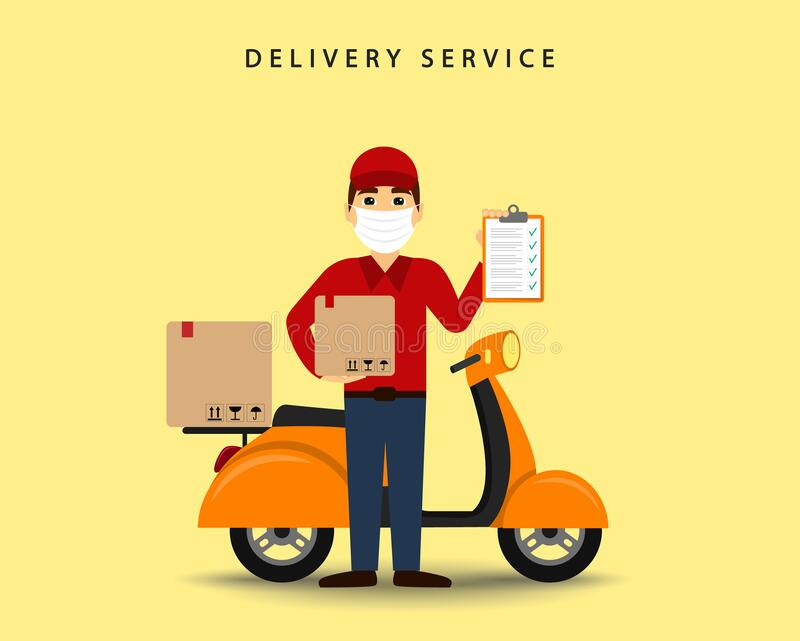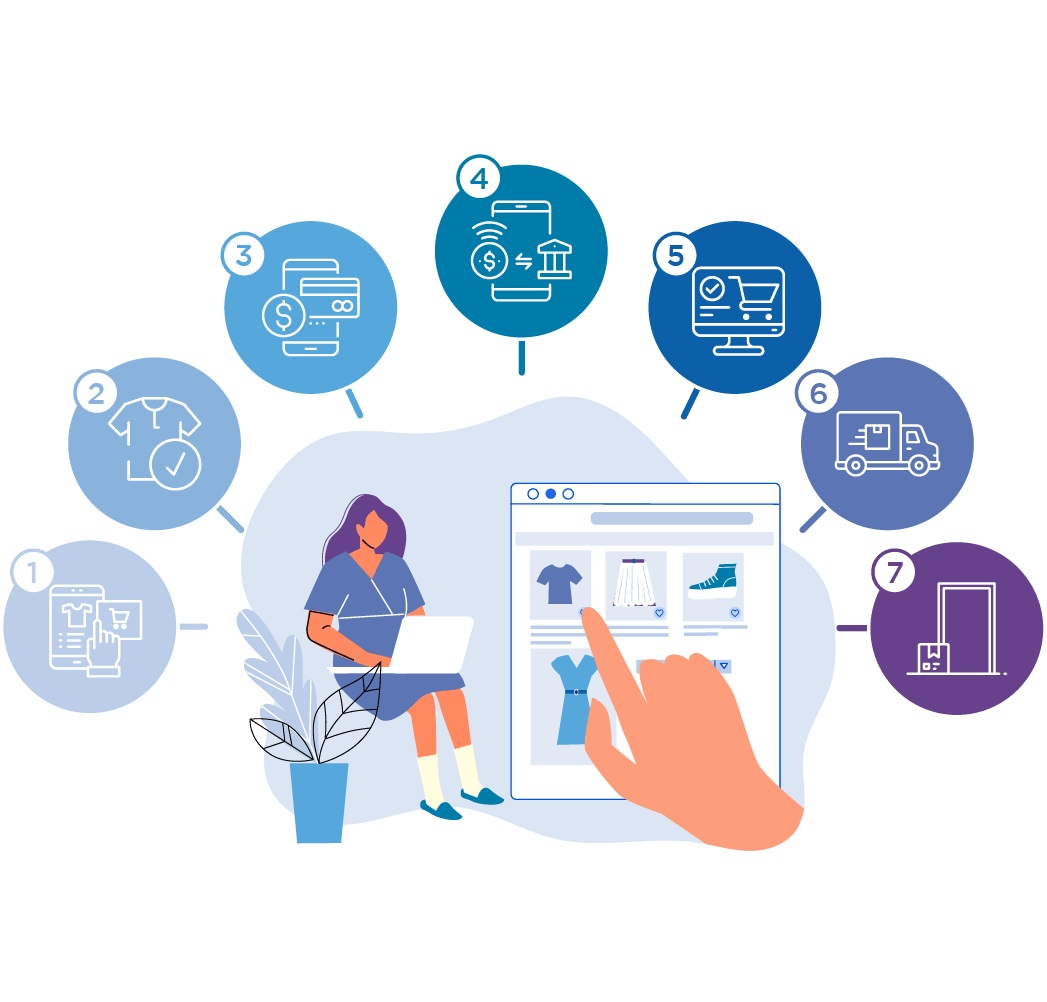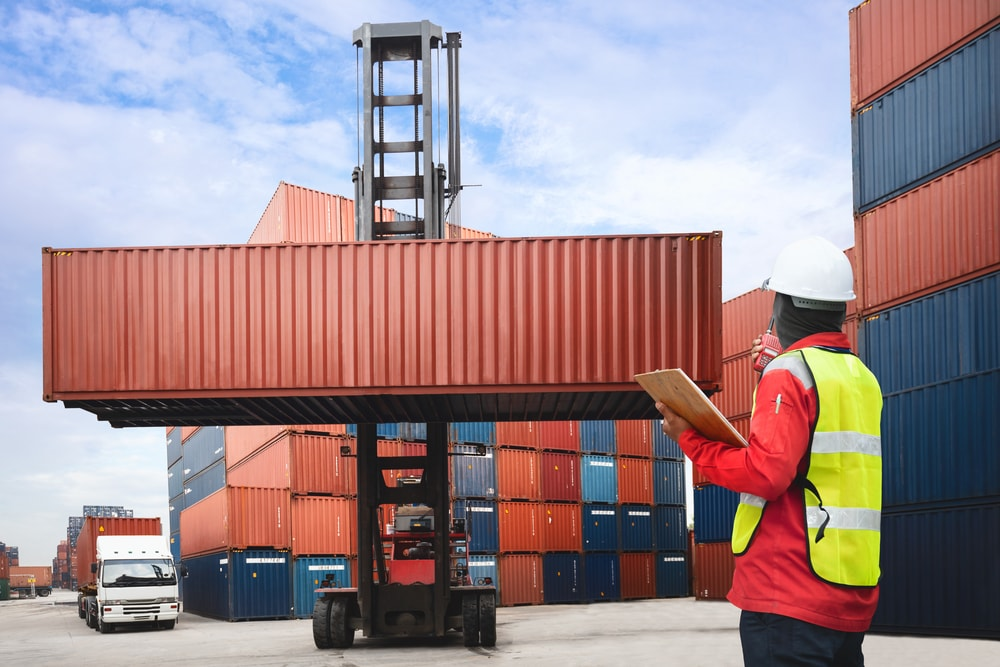Courier Delivery Executive (1 years diploma)
Courier Delivery Executive click here
Brief Job Description
Courier Delivery Executives are also known as Delivery Executives or Couriers. Individuals in this role are
on-the-road staff who are responsible for collecting packages from the local office and delivering them to
the customers at their doorstep. They are also responsible for verifying customer ID, collecting payment, if
applicable and obtaining customer signature. They are a critical part of courier operations as shipment
delivery is a crucial activity.

Personal Attributes
This job requires the individual to work well with his/her team and achieve joint goals. The individual must
be able to prioritize and execute tasks within scheduled time limits. The individual should be able to
maintain high concentration levels throughout his/her shift.
Prepare for Shipment Delivery
Description
This unit is about preparing for shipment delivery
Elements and Performance Criteria
Obtain requisite information for delivery
To be competent, the user/individual on the job must be able to:
PC1. obtain daily schedule and list of deliveries to be made with customer details such as name,
address, contact details, shipment ordered, etc. from the coordinator.
PC2. determine whether payment has been made or whether cash has to be collected on delivery.
PC3. understand priorities among orders and deadlines if any from coordinator
PC4. obtain the optimal routing sequence from the coordinator.
Prepare for delivery
To be competent, the user/individual on the job must be able to:
PC5. collect necessary equipment such as global positioning system (gps), tracking devices,
money pouch to carry money safely, etc.
PC6. perform a quick inspection of the vehicle to ensure that it is in suitable condition and ready
for the day’s trip
PC7. ensure sufficient availability of missed delivery notes and other stationery
PC8. collect all the packages to be delivered during the day’s trip
PC9. check to ensure that packages are in good condition and whether the package is to be
delivered nearby.
PC10. report to coordinator regarding any damage or errors with respect to the package not being
delivered to the area being visited and resolve issues.
PC11. load packages onto vehicle.
PC12. arrange shipments in an optimized manner in the vehicle to save space
PC13. shipments that are to be delivered first are to be arranged closest to the door
PC14. shipments should be arranged in a manner that they are not damaged
PC15. ensure availability to take instructions from supervisor and be flexible to change the day’s
plan
Knowledge and Understanding (KU)
The individual on the job needs to know and understand:
KU1. knowledge of organizational procedures
KU2. knowledge of paperwork to be completed when delivering a package
KU3. knowledge of organization’s products/services and their pricing
KU4. procedures for dealing with loss or damage to shipment
KU5. risk and impact of not following defined procedures/work instructions
KU6. knowledge of clients and their products being handled
KU7. knowledge of all relevant safety and security procedures
KU8. knowledge of coding system followed to label packages.
KU9. knowledge of types of shipment being handled
KU10. knowledge of operating a computer
KU11. knowledge of special characteristics and handling requirements of shipment, if any
KU12. knowledge of air waybills
KU13. excellent local and global geographical knowledge
KU14. ability to read labels and understand delivery details of the package
KU15. knowledge of the local areas and routes.
KU16. knowledge of how to use the gps and other tracking/navigation devices
KU17. knowledge of traffic rules that need to be followed.
Generic Skills (GS)
User/individual on the job needs to know how to:
GS1. ability to fill out customer forms and reimbursement forms
GS2. fill out any complaint/insurance related forms for damaged shipment
GS3. read labels and understand the labelling codes as per company procedures
GS4. read and understand customer and package details.
GS5. read and understand traffic signage.
GS6. communicate clearly with customers, supervisors and peers
GS7. regularly communicate with all employees in the chain of activities to ensure activities are
running smoothly
GS8. share best practices with peers and juniors
GS9. ability to make a decision when customers are not available
GS10. adjust according to volume, capacity and manpower needs during peak and non-peak hours
GS11. ability to concentrate on task at hand and complete it without errors
GS12. be a team player and achieve joint goals

GS13. understand the customer timelines and ensure that they are met
GS14. have a well-mannered and pleasant personality and dress-up
GS15. be aware of how to deal with the cultural sensitivity and delivering in case of women
receivers
GS16. identify trends/common causes for errors and suggest possible solutions to the manager
GS17. ability to rapidly identify and correct errors.
GS18. suggest methods to streamline the delivery process.
GS19. notice common accidents and suggest safety measures to prevent the same
GS20. ability to concentrate on task at hand and complete it without errors
Perform Delivery
Description
This unit is about performing delivery
Elements and Performance Criteria
Situations when the customer is available
To be competent, the user/individual on the job must be able to:
PC1. arrive at the destination
PC2. greet customer politely and confirm the shipment that had been ordered
PC3. if the package is important or of high value, request customer for a government issued id
card as proof of identity
PC4. verify and note down the details of the id proof shown
PC5. hand over package to customer
PC6. receive and store cash safely, if the customer had opted for cash on delivery option
PC7. get the customer’s signature (digitally or on paper) as acknowledgement that the shipment
had been received in good condition.
PC8. thank the customer and leave premises.
Situations when the customer is not available
To be competent, the user/individual on the job must be able to:
PC9. if the customer is not available, contact the customer by telephone and politely explain the
situation
PC10. if the package has been paid for and it does not required id proof verification, hand over
package to the person specified by the customer (receiver).
PC11. get the receiver’s signature (digitally or on paper) as acknowledgement that the shipment
had been received in good condition.
PC12. thank the receiver and leave premises
PC13. if the package has not been paid for or if it has to be delivered in person to the customer, fix
up a convenient time to deliver the package with the customer
PC14. if the customer could not be contacted, leave behind a missed delivery note with contact
details.
PC15. change the day plan accordingly to accommodate missed deliveries at the requested times.
Knowledge and Understanding (KU)
The individual on the job needs to know and understand:
KU1. knowledge of organizational procedures
KU2. knowledge of paperwork to be completed when delivering a package
KU3. knowledge of organization’s products/services and their pricing
KU4. procedures for dealing with loss or damage to shipment
KU5. risk and impact of not following defined procedures/work instructions
KU6. knowledge of clients and their products being handled
KU7. knowledge of all relevant safety and security procedures
KU8. knowledge of coding system followed to label packages.
KU9. knowledge of types of shipment being handled
KU10. knowledge of operating a computer
KU11. knowledge of special characteristics and handling requirements of shipment, if any.
KU12. knowledge of air waybills
KU13. excellent local and global geographical knowledge
KU14. ability to read labels and understand delivery details of the package.
KU15. knowledge of the local areas and routes.
KU16. knowledge of how to use the gps and other tracking/navigation devices
KU17. knowledge of traffic rules that need to be followed.
Generic Skills (GS)
User/individual on the job needs to know how to:
GS1. ability to fill out customer forms and reimbursement forms.
GS2. fill out any complaint/insurance related forms for damaged shipment
GS3. read labels and understand the labelling codes as per company procedures
GS4. read and understand customer and package details

GS5. read and understand traffic signage.
GS6. communicate clearly with customers, supervisors and peers
GS7. regularly communicate with all employees in the chain of activities to ensure activities are
running smoothly
GS8. share best practices with peers and juniors
GS9. ability to make a decision when customers are not available
GS10. adjust according to volume, capacity and manpower needs during peak and non-peak hours
GS11. ability to concentrate on task at hand and complete it without errors
GS12. be a team player and achieve joint goals
GS13. understand the customer timelines and ensure that they are met.
GS14. have a well-mannered and pleasant personality and dress-up
GS15. be aware of how to deal with the cultural sensitivity and delivering in case of women
receivers
GS16. identify trends/common causes for errors and suggest possible solutions to the manager.
GS17. ability to rapidly identify and correct errors.
GS18. suggest methods to streamline the delivery process.
GS19. notice common accidents and suggest safety measures to prevent the same
GS20. ability to concentrate on task at hand and complete it without errors
Perform Post Delivery activities
Description
This unit is about performing post-delivery activities
Elements and Performance Criteria
Return to office and complete handover to the counter staff
To be competent, the user/individual on the job must be able to:
PC1. bring any undelivered packages back to office.
PC2. document appropriate reason for undelivered package
PC3. park vehicle and carry out a safety inspection
PC4. unload packages and hand them over for storage
PC5. return gps, tracking devices and any unused stationery
PC6. handover the money collected from customers to the cashier and collect a receipt of
acknowledgement of the handover.
Reporting to management
To be competent, the user/individual on the job must be able to:
PC7. notify coordinator on the number of missed deliveries and their locations so that it could be
included in the next day’s plan
PC8. report any damages to packages that had occurred during transit.
PC9. provide feedback regarding delays, damages, loss if any etc
PC10. account for the money that has been collected from the customers and handed over to the
cashier
PC11. provide bills for reimbursement as per company policy (if any) out of pocket expenses have
been incurred.
PC12. report on the condition of the tracking devices, delivery vehicle and any maintenance or
replacement that might be required.
PC13. complete any forms as required by management such as insurance forms for damaged
shipment, reimbursement forms, etc.

Knowledge and Understanding (KU)
The individual on the job needs to know and understand:
KU1. knowledge of organizational procedures
KU2. knowledge of paperwork to be completed when delivering a package.
KU3. knowledge of organization’s products/services and their pricing
KU4. procedures for dealing with loss or damage to shipment
KU5. risk and impact of not following defined procedures/work instructions
KU6. knowledge of clients and their products being handled
KU7. knowledge of all relevant safety and security procedures
KU8. knowledge of coding system followed to label packages.
KU9. knowledge of types of shipment being handled
KU10. knowledge of operating a computer
KU11. knowledge of special characteristics and handling requirements of shipment, if any.
KU12. knowledge of air waybills
KU13. excellent local and global geographical knowledge
KU14. ability to read labels and understand delivery details of the package.
KU15. knowledge of the local areas and routes.
KU16. knowledge of how to use the gps and other tracking/navigation devices.
KU17. knowledge of traffic rules that need to be followed.
Generic Skills (GS)
User/individual on the job needs to know how to:
GS1. ability to fill out customer forms and reimbursement forms
GS2. fill out any complaint/insurance related forms for damaged shipment
GS3. read labels and understand the labelling codes as per company procedures
GS4. read and understand customer and package details.
GS5. read and understand traffic signage.
GS6. communicate clearly with customers, supervisors and peers
GS7. regularly communicate with all employees in the chain of activities to ensure activities are
running smoothly
GS8. share best practices with peers and juniors
GS9. ability to make a decision when customers are not available
GS10. adjust according to volume, capacity and manpower needs during peak and non-peak hours
GS11. ability to concentrate on task at hand and complete it without errors
GS12. be a team player and achieve joint goals
GS13. understand the customer timelines and ensure that they are met
GS14. have a well-mannered and pleasant personality and dress-up
GS15. be aware of how to deal with the cultural sensitivity and delivering in case of women
receivers
GS16. identify trends/common causes for errors and suggest possible solutions to the manager
GS17. ability to rapidly identify and correct errors
GS18. suggest methods to streamline the delivery process.
GS19. notice common accidents and suggest safety measures to prevent the same
GS20. ability to concentrate on task at hand and complete it without errors
Maintain Health, Safety and Security measures during shipment delivery
Description
This unit is about maintaining health, safety and security standards during shipment delivery
Elements and Performance Criteria
Maintain health, safety and security standards during shipment delivery
To be competent, the user/individual on the job must be able to:
PC1. maintain clean and hygienic vehicle
PC2. take all the necessary precautions when handling packages.
PC3. follow organization procedures with respect to security, materials handling and accidents
PC4. keep the bag with oneself while delivering the documents
PC5. do not leave the documents with security or any 3rd party
PC6. follow traffic rules when driving on the road.
Knowledge and Understanding (KU)
The individual on the job needs to know and understand:
KU1. knowledge of organizational procedures
KU2. knowledge of paperwork to be completed when delivering a package
KU3. knowledge of organization’s products/services and their pricing
KU4. procedures for dealing with loss or damage to shipment
KU5. risk and impact of not following defined procedures/work instructions
KU6. knowledge of clients and their products being handled
KU7. knowledge of all relevant safety and security procedures
KU8. knowledge of coding system followed to label packages
KU9. knowledge of types of shipment being handled
KU10. knowledge of operating a computer
KU11. knowledge of special characteristics and handling requirements of shipment, if any.
KU12. knowledge of air waybills
KU13. excellent local and global geographical knowledge
KU14. ability to read labels and understand delivery details of the package
KU15. knowledge of the local areas and routes
KU16. knowledge of how to use the gps and other tracking/navigation devices.
KU17. knowledge of traffic rules that need to be followed.

Generic Skills (GS)
User/individual on the job needs to know how to:
GS1. ability to fill out customer forms and reimbursement forms.
GS2. fill out any complaint/insurance related forms for damaged shipment
GS3. read labels and understand the labelling codes as per company procedures
GS4. read and understand customer and package details
GS5. read and understand traffic signage.
GS6. communicate clearly with customers, supervisors and peers
GS7. regularly communicate with all employees in the chain of activities to ensure activities are
running smoothly
GS8. share best practices with peers and juniors
GS9. ability to make a decision when customers are not available
GS10. adjust according to volume, capacity and manpower needs during peak and non-peak hours
GS11. ability to concentrate on task at hand and complete it without errors
GS12. be a team player and achieve joint goals
GS13. understand the customer timelines and ensure that they are met
GS14. have a well-mannered and pleasant personality and dress-up
GS15. be aware of how to deal with the cultural sensitivity and delivering in case of women
receivers
GS16. identify trends/common causes for errors and suggest possible solutions to the manager
GS17. ability to rapidly identify and correct errors.
GS18. suggest methods to streamline the delivery process.
GS19. notice common accidents and suggest safety measures to prevent the same
GS20. ability to concentrate on task at hand and complete it without errors
Employability Skills (30 Hours)
Description
This unit is about employability skills, Constitutional values, becoming a professional in the 21st Century,
digital, financial, and legal literacy, diversity and Inclusion, English and communication skills, customer
service, entrepreneurship, and apprenticeship, getting ready for jobs and career development.
Scope
The scope covers the following :
Introduction to Employability Skills
Constitutional values – Citizenship
Becoming a Professional in the 21st Century
Basic English Skills
Communication Skills
Diversity & Inclusion

Financial and Legal Literacy
Essential Digital Skills
Entrepreneurship
Customer Service
Getting ready for Apprenticeship & Jobs
Elements and Performance Criteria
Introduction to Employability Skills
To be competent, the user/individual on the job must be able to:
PC1. understand the significance of employability skills in meeting the job requirements
Constitutional values – Citizenship
To be competent, the user/individual on the job must be able to:
PC2. identify constitutional values, civic rights, duties, personal values and ethics and
environmentally sustainable practices
Becoming a Professional in the 21st Century
To be competent, the user/individual on the job must be able to:
PC3. explain 21st Century Skills such as Self-Awareness, Behavior Skills, Positive attitude, selfmotivation, problem-solving, creative thinking, time management, social and cultural
awareness, emotional awareness, continuous learning mindset etc.

Basic English Skills
To be competent, the user/individual on the job must be able to:
PC4. speak with others using some basic English phrases or sentences
Communication Skills
To be competent, the user/individual on the job must be able to:
PC5. follow good manners while communicating with others
PC6. work with others in a team







